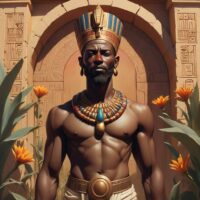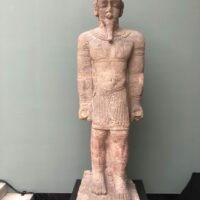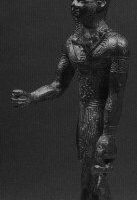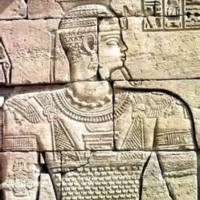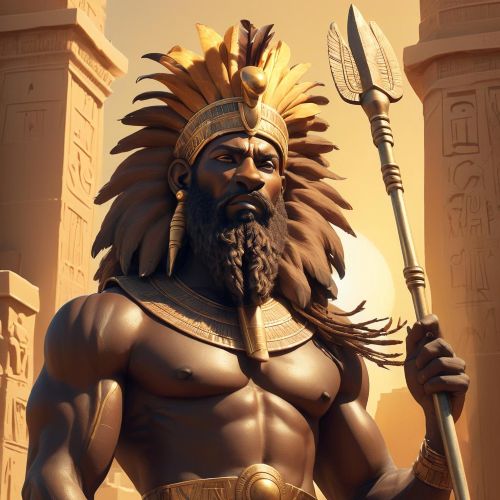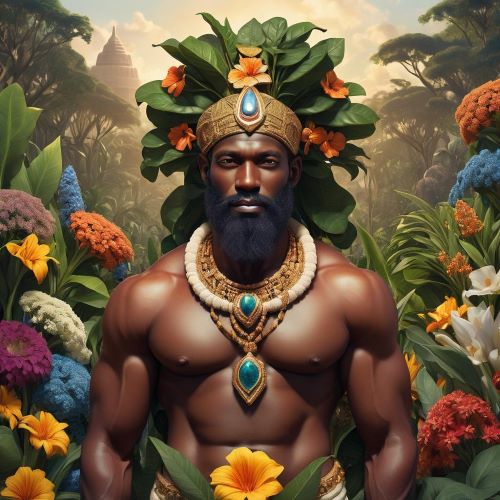Sebiumeker : God of Fertility
Listen
At a glance
| Description | |
|---|---|
| Origin | Nubian Mythology |
| Classification | Gods |
| Family Members | N/A |
| Region | southern Egypt and northern Sudan |
| Associated With | Fertility, Procreation |
Seibumeker
Introduction
Sebiumeker, a central deity in Nubian mythology, is revered as the god of procreation and fertility. Worshipped primarily in the ancient kingdom of Kush, located in what is now Sudan, Sebiumeker embodies a blend of Nubian and Egyptian religious traditions. His significance is deeply rooted in the agricultural and spiritual life of the Nubian people, highlighting the essential role of fertility in their daily existence. This divine figure, also known as Sabomakal, was not only a symbol of fertility but also a protector and guardian, reflecting his broader influence in Nubian culture. Temples, artifacts, and artwork dedicated to him attest to his prominence and the profound respect the Nubians held for Sebiumeker in both their spiritual and practical lives.
Physical Traits
Sebiumeker is often depicted with several distinctive features that reflect both his divine nature and cultural significance. Wearing the ancient double crown, a symbol of supreme authority, he is portrayed with a false beard, a kilt, and a tunic, reminiscent of the Egyptian god Atum. His statues are often marked by large ears, a symbol of importance, and a uraeus (cobra) on his crown, emphasizing his divine status. This portrayal blends Egyptian and Nubian artistic elements, showcasing the cultural exchange between the two regions.
Representations of Sebiumeker, often found near temple doorways, highlight his role as a guardian deity. These statues were placed at thresholds, symbolizing the transition between the sacred and the everyday, with Sebiumeker serving as a protector who ensured both fertility and the continuity of life. His Meroitic name, Sabomakal, further reflects the fusion of Nubian traditions and the broader cultural influence of Egypt.
Family
Sebiumeker’s family connections remain somewhat mysterious, though he is closely linked with Arensnuphis, who may be either his brother or partner. This relationship mirrors the familiar dynamics seen in Egyptian mythology, such as the bond between Set and Osiris, illustrating the shared divine themes between Nubian and Egyptian belief systems. These familial ties emphasize the significance of lineage and divine heritage in Nubian religious thought.
In the broader Meroitic pantheon, Sebiumeker’s association with other deities enriches his role in the divine hierarchy. He is often depicted alongside Arensnuphis, a fellow fertility god, highlighting the central importance of procreation in Nubian culture. This divine kinship reflects the complexity of the ancient Meroitic belief system, reinforcing values of family and community. Sebiumeker’s connections extend further to include deities like Khnum, a higher god associated with craftsmanship and creation. This association elevates Sebiumeker’s position within the divine order, emphasizing his role as both protector and administrator in the cosmic structure.
Other names
Sebiumeker, though most commonly known by this name, is also associated with various titles and epithets that highlight his diverse roles within the Nubian pantheon. The name “Sebiumeker,” meaning “the faceless one,” suggests an air of mystery surrounding his character and the way he was viewed by his worshippers. This title emphasizes his enigmatic nature and his spiritual presence, which transcended traditional forms of representation.
His protective role is central to his identity, as reflected in the titles that associate him with fertility, agriculture, and guardianship. These epithets reinforce his importance in safeguarding the community’s well-being and ensuring the prosperity of their lands. Sebiumeker’s connection to fertility and creation is further underscored through his link to the Egyptian god Atum, with whom he shares similar qualities, especially in relation to the themes of creation and cosmic order.
In addition to “Sebiumeker,” this deity is known by several other names that deepen his significance within Nubian religious practices. His Meroitic name, Sabomakal, links him to the region’s specific cultural and spiritual identity. As Lord of Musawwarat, he is tied to the ancient site of Musawwarat es-Sufra, reflecting his connection to sacred spaces and the spiritual landscape of Nubia. Lastly, his role as a Guardian God is emphasized by the discovery of his statues placed near doorways, reinforcing his function as a protector, overseeing transitions between the sacred and the everyday.
Powers and Abilities
Sebiumeker’s divine powers are deeply tied to fertility, agriculture, and procreation. As a fertility god, he was called upon to bless individuals, households, and the land, ensuring prosperity and abundance. In agrarian societies, where the success of crops and livestock was crucial, his favor was considered essential for a thriving community.
Beyond his role in fertility, Sebiumeker also served as a guardian of transitions, particularly at gateways. The positioning of his statues near temple entrances reflects his protective nature, offering blessings and safeguarding those who entered sacred spaces. His dual nature is evident in his narratives: while he is a god of life, growth, and fertility, he is also capable of harsh retribution against those who defy him. This balance between nurturing and vengeance highlights his complex role in Nubian spirituality.
Modern Day Influence
Sebiumeker’s legacy endures through various modern platforms, where his influence continues to shape art, literature, and pop culture. His presence in contemporary portrayals of Nubian mythology helps connect ancient beliefs with modern narratives, allowing new generations to explore his role in spiritual and cultural history. In video games like *Civilization VI*, Sebiumeker’s character is incorporated into gameplay, sparking interest in Nubian mythology and introducing his significance to a wider audience. This modern engagement highlights how ancient deities, like Sebiumeker, continue to captivate the imagination in today’s world.
Additionally, Sebiumeker’s legacy lives on in the cultural practices of Sudan and the Nubian diaspora, where his worship is still invoked in various festivals. Archaeological discoveries, such as statues and artifacts tied to Sebiumeker, continue to shed light on the religious practices of ancient Nubia, underscoring his importance in both historical and spiritual contexts. The growing academic interest in Nubian heritage further emphasizes the relevance of Sebiumeker and other deities, reaffirming the significant contributions of Nubian culture to global history and its lasting influence on contemporary society.
Related Images
Frequently Asked Questions
What is lorem Ipsum?
I am text block. Click edit button to change this text. Lorem ipsum dolor sit amet, consectetur adipiscing elit. Ut elit tellus, luctus nec ullamcorper mattis, pulvinar dapibus leo.
What is lorem Ipsum?
I am text block. Click edit button to change this text. Lorem ipsum dolor sit amet, consectetur adipiscing elit. Ut elit tellus, luctus nec ullamcorper mattis, pulvinar dapibus leo.
What is lorem Ipsum?
I am text block. Click edit button to change this text. Lorem ipsum dolor sit amet, consectetur adipiscing elit. Ut elit tellus, luctus nec ullamcorper mattis, pulvinar dapibus leo.
What is lorem Ipsum?
I am text block. Click edit button to change this text. Lorem ipsum dolor sit amet, consectetur adipiscing elit. Ut elit tellus, luctus nec ullamcorper mattis, pulvinar dapibus leo.
What is lorem Ipsum?
I am text block. Click edit button to change this text. Lorem ipsum dolor sit amet, consectetur adipiscing elit. Ut elit tellus, luctus nec ullamcorper mattis, pulvinar dapibus leo.

